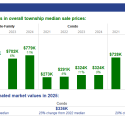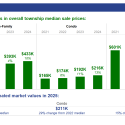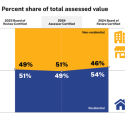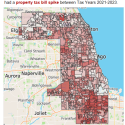Cook County Assessor’s Office Publicly Releases Residential Assessment Code and Models
Wednesday, April 17, 2019
Cook County Assessor’s Office Publicly Releases Residential Assessment Code and Models
Groundbreaking effort puts Cook County at the forefront of open government and technology
CHICAGO – Cook County Assessor Fritz Kaegi and Chief Data Officer (CDO) Rob Ross announced the public release of the Cook County Assessor’s Office’s (CCAO) residential assessment and modeling code as well as its underlying datasets. In doing so, the Assessor’s Office broke new ground in transparency for both its own office and assessing offices around the country.
In front of a packed, sold-out crowd at Chi Hack Night–the city’s monthly gathering of coders journalists, academics, and civic technologists–Assessor Kaegi and CDO Ross pushed the code live by selecting an audience member at random to join them and hit the publish button, symbolically demonstrating the nature of its work as by, for, and of the citizens of Cook County.
“This is unprecedented for our office and also puts us in a leading position among our peers in other metro areas,” said Assessor Kaegi. “We have some long-term technological challenges to overcome in our office, but we haven’t let them stop us from innovating wherever we can, particularly when it comes to transparency.”
In the past, the CCAO only released its models and code when compelled to do so through freedom of information requests or court order. Assessor Kaegi’s administration promised to voluntarily make its code, models, and data available to the public to let journalists and technologists verify that the CCAO’s models were delivering on its promise of fairness and equity.
The CCAO published its code and data on GitLab, an open-source online platform for software development, as well as the Cook County Open Data Portal. Publishing the code on the Data Portal is part of the CCAO’s ongoing partnership with the Cook County Board of Technology.
“Transparency in civic technology is a two-way street. We expect journalists, academics, and coders to use this data in a way that not only lets them check our work, but also improve it,” said CDO Ross.
The release of the code and underlying data follows the publication of new township-level reporting on the Office’s assessment methodology and modeling. Approximately 40 pages of residential and commercial reporting has been and will continue to be released on each re-assessed township for the northern suburbs of Cook County. As part of its triennial system, the south suburbs will be re-assessed next year and the city of Chicago in 2021.
Assessor Kaegi will discuss the code release and the CCAO’s re-assessment process as part of his ongoing countywide listening tour. The next stop on the tour will be this Saturday, April 20th at 1pm. Cook County Commissioner Luis Arroyo Jr. will join Assessor Kaegi for the event at Mary Lyon Public School (2941 N. McVicker Ave., Chicago), featuring a Q&A session with Vanessa Valentin of the Northwest Side Housing Center and members of the public. Spanish language translation will be available. Additional information about the listening tour is available at cookcountyassessor.com.
Resources:
Photos and documentation of public code release at Chi Hack Night:
https://twitter.com/AssessorCook/status/1118293162659844102
Data narrative (via the Cook County Open Data Portal):
https://datacatalog.cookcountyil.gov/stories/s/p2kt-hk36
Modeling Data:
Assessment data:
First Pass Values:
Full code base on GitLab:
https://gitlab.com/ccao-data-science---modeling/ccao_sf_cama_dev





